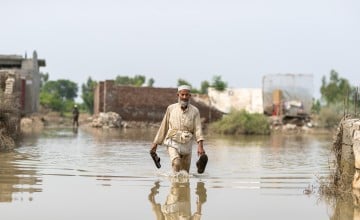
Read our 2022 annual report

Knowledge Hub
Pakistan faces monumental hunger crisis after floods

Flood-torn Pakistan faces a monumental hunger crisis and a stark winter with crops destroyed and millions of people still destitute after flooding left much of the country under water, Concern Worldwide has warned.
The Irish humanitarian organisation is continuing to help Pakistan with its response after an area several times the size of Ireland was left submerged following weeks of extreme monsoon rainfall in the summer.
Concern is calling for more support to fund these life-saving efforts as the UN also makes a fresh global appeal today to respond to the crisis.
The monsoon flooding, which UN Secretary-General Antonio Guterres described as “climate carnage," affected 33 million people with over 1,600 fatalities and over 12,800 injuries.
Almost eight million people were displaced and there are an estimated 598,000 people living in relief camps.
The epic floods also damaged or destroyed millions of acres of food crops, over two million homes, 13,000km of roads and more than 400 bridges.
“The level of devastation is enormous with millions living under the open sky,” said Concern Worldwide’s Pakistan acting Country Director, Sherzada Khan.
“Millions of people still have nothing two months on from the disaster and people are dying from diseases caused by drinking dirty contaminated water and living in dire conditions.
“Vast amounts of food crops were destroyed and are still under flood waters that have yet to recede.
“Food insecurity is increasing and, according to the latest estimates from officials, Pakistan lost almost 15 per cent of its rice crop in the floods, which also destroyed many farming families’ grain reserves.
“There are huge areas where land is still not prepared for sowing wheat, which is a major food crop here in Pakistan. Land preparation and sowing usually starts this month.
“This, along with the huge number of fallen and dead livestock, means Pakistan is facing a monumental hunger crisis that requires support from the international community.”
The floods were caused by weeks of extreme monsoon rainfall after months of extreme heat waves and at a time when Pakistan was trying to cope with a major economic crisis with high inflation and food and fuel prices rocketing.
Preliminary estimates by the World Bank suggest the national poverty rate could increase because of recent floods by 4.5 to 7 percentage points, pushing between 9.9 and 15.4 million people into poverty and intensifying the severity of poverty for already poor households.
“The destruction is immense and upsetting to witness,” added Concern’s emergency response manager in Pakistan, Shafqat Ullah.
“The conflict in Ukraine has also disrupted the supply chain of wheat grain, seed and fertilisers into Pakistan.
“However, there is hope and we are already seeing positive results from the thousands of people we have been reaching, with one mother telling me that the money we gave her saved her and her family from starving.
“That means her children didn’t go hungry thanks to the support we got from Ireland, Britain, America and other nations.
“There are also outbreaks of diseases like malaria, typhoid and diarrhoea, which is a worrying issue that has sadly already taken some lives.
“Concern is providing cash, clean water, food and shelters thanks to funding from members of the public along with donations from government organisations like Irish Aid, the UK’s Foreign Commonwealth and Development Office (FCDO) and USAID.
“The needs are enormous and more support is needed due to the scale of the catastrophe.”
Anyone who would like to support Concern’s Pakistan Floods Emergency Appeal can go to concern.net/donate/pakistan-floods-emergency-appeal or call 0818 211 844.
ENDS
For media queries or interview requests contact Kevin Jenkinson at kevin.jenkinson@concern.net or on 086 358 2886.
Other ways to help
Corporate support
Is your company interested in working together for a common cause?
Fundraise for Concern
From mountain trekking to marathon running, cake sales to table quizzes, there are lots of ways you can support our work.
Buy a gift
With an extensive range of alternative gifts, we have something to suit everybody.
Leave a gift in your will
Leave the world a better place with a life-changing legacy.
Volunteer with Concern
The lots of ways to get involved with our work as a volunteer
School fundraising
Without the generous support from schools, we wouldn't be able to do the work that we do.

